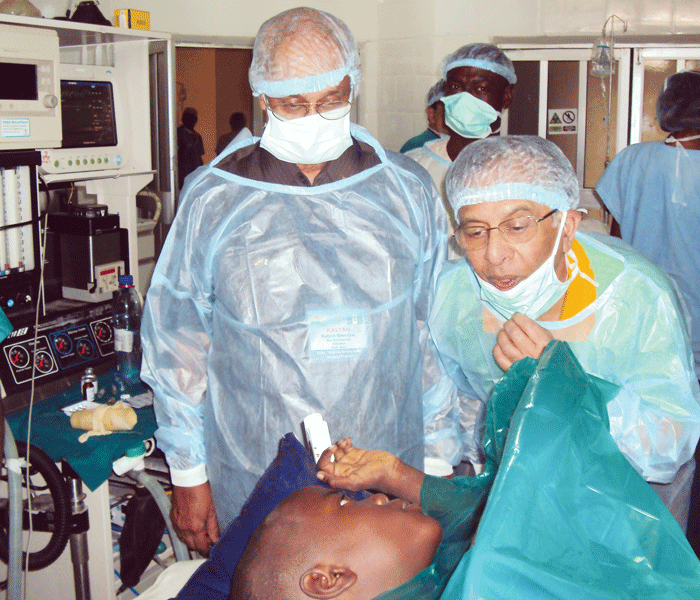
As Rotarians in Pakistan grapple with the shooting of their polio workers, it is interesting to trace the work done by Indian Rotarians in the quest of not only a polio-free India, but also world.
At the December Chennai Institute, PRIP Rajendra K Saboo, who has organised medical missions to Africa, recalled his experiences in Nigeria where Rotary India has conducted polio corrective surgical camps. In the disturbed northern region of Nigeria, polio immunisation has been difficult for long years. “The challenge was to get children from the north, as we couldn’t go there. The parents we talked to at the polio corrective surgery camp admitted that their children could have been spared the ordeal of corrective surgery had they been given two drops of polio vaccine a few times. Some of them cried and said ‘we’ll go back and see not only our but our neighbours’children are immunised too’.”
Genesis
The genesis for the Rotary India medical missions to Nigeria, which now has six polio cases, is linked to the work Indian Rotarians have done at home. Saboo recalls that in their continuing quest to make India polio-free, near the turn of the century, when he and other Rotarians were near a polio immunisation camp in Hapur, near Delhi, they got a phone call that 5 or 6 minority community families were resisting the administration of polio drops to their children. “So we rushed there and were able to, with help from some people from the community, convince them.”
But then, as they were chatting with the village head and others, “we saw one child, maybe 2 or 3 years old, crawling up to us. Suddenly there was another child crawling from another direction and we realised that the polio-virus transmission should be maximum here.”
When the villagers described these children as “dirt” and said they “were finished and nothing can be done with them, I told my Rotarian friends that here is our opportunity.” With Rotarians who had accompanied him to Africa for polio corrective surgery, within a month a similar surgical camp was organised here and 150 polio corrective operations done. While some children were able to stand and walk with callipers, others, who were slightly affected were able to walk like normal children after the surgery. “One thing our team assured was that all of them will be able to have a better quality of life … a dignified life,” says Saboo.
After this surgical exercise, in the next round of immunisation, the level and percentage of immunisation “suddenly shot up by 50 per cent. The people thought here are Rotarians who are coming to us as friends who want to help our children; so we should listen to them.”
Camps in Bihar, UP
This became a trigger for more such camps in Bihar and Uttar Pradesh and 4,000–5,000 children were reached. “This was a strong signal to their parents that they shouldn’t put their younger children through such an ordeal,” says Saboo.
This was the background and inspiration to take a medical mission to Nigeria with orthopaedic surgeons who had done polio corrective surgeries. The team had 25 surgeons and “there was no question of going to the north as they were shooting people there.” So the camp was held in Abuja, Central Nigeria in 2012 and conducted in collaboration with the Rotarians of India and Nigeria and the Nigerian government. The 25 surgeons did 780 surgical procedures on 352 polio-afflicted patients — some required more than one operation — at the University of Abuja Teaching Hospital.
“The children from affected areas in the north and from a distance of 300 to 400 miles were brought to our camp. In nine days we were able to help 352 children who were operable. Some were such terrible cases that we couldn’t do anything. PRIP Kalyan Banerjee also came and stayed there for a few days and we met the children and their parents who were crying and said ‘god bless you for what you are doing. You come from a place which has no connection with us, and are working for the benefit of our children,’ ” recalls Saboo.
He adds that the parents, many of them Muslims, said there were rumours that polio immunisation was a conspiracy by the west to reduce the Muslim population. They said, “But you have nothing to do with the West, and all you want is help our children.” So we told them, “Return to your homes. Your children are now better but take care of their siblings, and the larger community.”
What he remembers best from such medical missions are deeply touching human experiences.
A special connect
One such incident he recalls relates to a little girl — “I have a way with children and can keep them happy. Earlier
I was mortally afraid of blood, but have now got used to it.” At the camp, he heard a little girl, barely 2 or 3 years old, howling as the nurse placed her on the stretcher. “I rushed there and lifted the child in my arms and patting her, walked around the corridor.”
After the surgeries, the parents cried and said we won’t allow this to happen to our younger children.
She quietened down, perhaps went to sleep and when the surgeon had a vacant bed, he placed her on it, but she started crying again. He picked her up again, “she clung to me and quietened down.” This went on for a while, till he was too tired to continue the exercise. “But I felt a kind of relationship; perhaps that little girl saw in me the face of her father or I saw in her the face of my granddaughter.”
Such “relationships remain etched in the memory, and inspire us to do more work,” adds Saboo.
His engagement to Nigeria continues; the latest is organising three vans to serve as medical clinics. (Details in the January 2015 issue of Rotary News).






